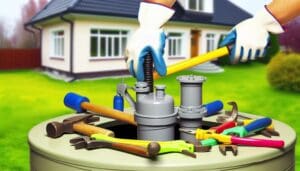Discover how to protect your septic system from breakdown with...
Read MoreYou & Your Septic Tank
The Science Of Septic Tank Pumping: How It Works And Why It Matters
Our professional septic service team offers comprehensive septic tank pumping services to keep your system running smoothly. Get a FREE Quote Today.

The Science Of Septic Tank Pumping: How It Works And Why It Matters
I bet you’ve never given much thought to what happens when you flush your toilet or drain water from your sink. I mean, why would you? It’s not exactly the most glamorous subject, right?
But here’s the thing – it actually matters quite a bit! You see, if we don’t properly maintain our septic systems, they can fail and cause all kinds of nasty problems.
That’s where my passion for septic tank pumping comes in (yeah, I know it sounds weird), but trust me on this one; understanding how it works and why it matters is crucial for maintaining a healthy home and environment.
Now let me tell ya, there’s something incredibly liberating about knowing that your household waste is being taken care of efficiently and safely. No more worrying about sewage backups or foul odors coming from your yard!
So go ahead, indulge that subconscious desire for liberation by diving into the fascinating world of septic tank pumping with me. Together, we’ll explore the science behind this essential service and discover just how important it really is in keeping our homes running smoothly and protecting our natural surroundings.
Let’s dive into those tanks like fearless explorers determined to uncover their mysteries – after all, knowledge truly is power!
What Is Septic Tank Pumping?
Did you know that over 21 million homes in the United States rely on septic systems to treat their wastewater? With so many people depending on this method, it’s crucial for homeowners like us to understand septic tank pumping and its importance.
As a septic tank expert, I can’t stress enough how vital proper maintenance is when it comes to adhering to septic regulations and ensuring tank safety.
Septic tank pumping is the process of removing sludge, scum, and liquid from your tank to prevent system failure or backups.
Now, let me tell you why this matters: Regularly scheduled pumping not only keeps our tanks functioning optimally but also helps protect our environment by preventing contamination of groundwater or nearby water sources.
Plus, staying up-to-date with septic regulations ensures we’re doing our part in maintaining public health standards.
So, as responsible homeowners seeking liberation from costly repairs and potential environmental hazards, it’s time we prioritize our septic systems’ upkeep!
Next up, let’s dive into understanding the benefits of diligent septic tank maintenance and how it’ll make a world of difference for both our wallets and well-being.
The Benefits Of Septic Tank Maintenance
Now that we’ve explored what septic tank pumping is all about, let’s dive into the benefits of regular maintenance. Keeping your septic system in tip-top shape not only increases its lifespan but also contributes to a healthier environment for you and your family. Plus, it can actually save you money in the long run by preventing costly repairs or even replacement of the entire system.
There are several key advantages to maintaining your septic tank:
- Water conservation: A well-maintained septic system ensures that wastewater is treated efficiently, reducing overall water usage and minimizing waste.
- Soil saturation prevention: Regular pumping helps prevent soil saturation around your drain field, which could otherwise lead to an unsightly and smelly mess on your property.
- Environmental protection: By properly treating and disposing of wastewater, you’re safeguarding local ecosystems from contamination caused by harmful bacteria and pollutants present in untreated sewage.
By embracing these crucial aspects of septic tank maintenance, you’ll be doing your part to preserve our planet’s precious resources while enjoying peace of mind knowing that your home’s plumbing systems are functioning optimally.
With this newfound knowledge under our belts, let’s continue our journey towards liberation by delving deeper into understanding how the intricate components of a septic system work together harmoniously.
Understanding The Septic System
Let’s get real, folks. Who would’ve thought that you’d be here, reading about the exciting world of septic systems? But don’t worry, we’re in this together – and trust me; it’s more important than you might think. Understanding your septic system can help with monitoring levels and saving water while also giving you a refreshing sense of liberation.
So let’s dive into our septic systems’ fascinating mechanics by taking a look at its three main components:
| Component | Function | Maintenance Required |
|---|---|---|
| Septic Tank | Receives wastewater from the home, separates solids from liquids & begins breaking them down | Regular pumping every 3-5 years |
| Drain Field | Disperses treated liquid waste (effluent) into the ground | Inspect for signs of saturation or standing water |
| Soil | Provides final filtration as effluent percolates through layers | Avoid compaction & plant only shallow-rooted vegetation |
Knowing how each component works and why they matter will make things easier when it comes to maintaining your system properly. A well-maintained septic system is vital to protecting both public health and the environment, not to mention keeping some extra dollars in your pocket! So before we move on to knowing when to pump your tank, let’s discuss some preventative measures such as reducing water usage, avoiding excess chemicals going down the drain, and proper landscaping around your septic field. Stay tuned for tips on recognizing those telltale signs that indicate it’s time for maintenance action.
Knowing When To Pump Your Tank
Now that you have a basic understanding of how septic tank pumping works and why it’s so important, let’s talk about when to pump your tank. Monitoring levels and calculating capacity are crucial aspects of knowing the right time for septic tank maintenance. After all, we’re striving for liberation from potential problems in our lives – and taking care of our wastewater system is no exception.
Here are four key factors to help determine when it’s time to pump your septic tank:
- Frequency of use: If your household generates a large amount of wastewater daily (think multiple people showering, doing laundry, etc.), you’ll need to get your septic tank pumped more frequently than those with less activity.
- Size of the tank: A larger tank will hold more waste before reaching its maximum capacity, meaning it will require pumping less often compared to a smaller one.
- Amount of solid waste: The type and quantity of solids produced by your household greatly impact how quickly sludge accumulates at the bottom of the tank – which ultimately determines when you should schedule pumping service.
- Age and condition: Older tanks or those not well-maintained may require more frequent cleanings to keep them functioning properly.
Taking these factors into account can ensure that you’re staying on top of maintaining a healthy septic system while avoiding costly repairs or damage down the line.
So next up, let’s discuss some tips for properly scheduling septic service without making it feel like a chore!
Properly Scheduling Septic Service
You may be wondering, ‘When should I schedule my septic tank service?’ Well, let me tell you a little secret that could save you time and money.
Properly scheduling your septic service can have significant cost-saving benefits while also preventing potential safety issues related to an overflowing or malfunctioning system. The key is knowing the right frequency for pumping out your septic tank based on its size, usage, and other factors such as local regulations.
By staying on top of regular maintenance, not only will you avoid costly repairs down the line, but you’ll also ensure smooth operation and extend the life of your septic system—ultimately contributing to a more sustainable environment.
So now that we’ve covered why it’s essential to stay on schedule with your septic services, let’s transition into finding a reputable company who can help keep everything running smoothly for years to come.
Finding A Reputable Septic Company
Now that you understand the importance of septic tank pumping and its role in maintaining a healthy and functioning system, it’s time to talk about finding a reputable company to handle this crucial task. Trust me, I’ve been around the block when it comes to working with various septic companies, and not all are created equal. It can be a daunting task trying to find someone who is both knowledgeable and trustworthy; but fear not! I’ll guide you on your journey toward liberation from potential septic nightmares.
Here’s what you should consider when choosing the perfect septic company for you:
- Pump selection: A great company will have an array of pumps available suited for different types of systems or specific needs. Make sure they’re able to provide a pump appropriate for your tank capacity.
- Tank capacity: Ensure that the company has experience dealing with tanks similar in size and type as yours. The last thing you want is someone inexperienced handling one of your home’s most vital components!
- Reviews & Testimonials: Word-of-mouth referrals and online reviews can paint a pretty accurate picture of how reliable and competent a company may be. Don’t hesitate to ask neighbors, friends, or family members for recommendations.
Once you’ve found the perfect match for your septic tank pumping needs, rest assured knowing that your home’s wastewater management is in good hands! With proper care and maintenance provided by professionals, worries can melt away like grease down a drain (just kidding—remember never to pour fats or oils into your drains!).
Stay tuned as we dive deeper into our next discussion about understanding the intricacies behind the science of septic system design.
The Science Of Septic System Design
Did you know that approximately 20% of American households rely on septic systems to treat their wastewater? That’s a staggering number, and it highlights the importance of proper septic system design for our health and environment.
As a septic tank pumping expert, I can’t stress enough how crucial it is to have an efficiently designed septic system in place. Not only does it protect us from harmful bacteria and contaminants, but it also prevents groundwater pollution and preserves soil drainage.
One essential aspect of a well-designed septic system is the incorporation of biofilters. These natural filters play a crucial role in breaking down pollutants as they pass through different layers within the drain field – ultimately converting them into less harmful substances. A properly functioning biofilter allows water to be safely dispersed back into the ground while maintaining good soil drainage conditions. This ensures that your yard remains lush and green rather than becoming soggy or flooded due to poor drainage.
So remember, next time you’re enjoying your beautiful backyard oasis, take a moment to appreciate the science behind its upkeep! Now that we’ve discussed the significance of septic system design let’s move forward by exploring how to identify warning signs of potential septic system failure without further ado.
Identifying Warning Signs Of Septic System Failure
Now that we’ve delved into the science behind septic system design, let’s move on to understanding how pumping works and why it matters. As a septic tank pumping expert, I can’t stress enough the importance of regular maintenance for your septic system. It not only helps keep our environment clean but also saves you from costly repairs down the road.
When warning signs of septic system failure start appearing, acting quickly is crucial. Some red flags include:
- Sudden flooding in your yard or around the drain field
- This could indicate an overfilled tank or damaged drainage pipes.
- Foul odors coming from drains or near the septic tank
- These smells are often caused by waste buildup, which needs immediate attention.
Paying close attention to these warning signs will give you ample time to address any issues before they escalate into bigger problems. Remember – prevention is better than cure!
While dealing with sudden flooding or foul odors may seem daunting at first, knowing what steps to take will help alleviate your concerns and set you on a path towards liberation from potential disasters. Up next, we’ll discuss some preventative measures you can implement to safeguard your septic system against future failures.
Preventative Measures To Take
Regular inspections are crucial for the longevity of your septic system. I always recommend that my clients get their tanks inspected at least once a year, to make sure there are no issues that need to be addressed. Proper maintenance is also key, so you’ll want to make sure you’re regularly pumping and cleaning your tank, as well as any other components that are part of your system. Lastly, if your system is old, it may be worth considering septic system upgrades, which can help you save money in the long run by avoiding costly repairs in the future.
Regular Inspections
You know what they say, ‘An ounce of prevention is worth a pound of cure,’ and I couldn’t agree more when it comes to septic tank maintenance.
As an expert in the field, let me tell you that regular inspections should be at the top of your list for preventative measures.
Not only will this help ensure everything’s working as it should but also give you peace of mind knowing you’re taking proper care of your system.
During these checkups, we’ll make sure your tank is properly sized and discuss if any tank additives are necessary – because who doesn’t want their septic system running smoothly?
Plus, by staying on top of things like this, it frees up time and energy for other aspects of life that bring us joy and liberation.
So remember, don’t wait until there’s a problem – schedule those inspections today!
Proper Maintenance
Now that we’ve talked about the importance of regular inspections, let’s dive into proper maintenance – another key aspect in taking good care of your septic system.
As a seasoned expert, trust me when I say this is crucial for both its longevity and safe usage.
Proper maintenance includes pumping out the tank regularly to avoid sludge buildup and watching what you flush down those toilets – remember, not everything belongs there!
And don’t forget to keep an eye on your drain field; ensuring it remains clear from any obstructions will help maintain optimal performance.
By prioritizing these preventative measures, you’re actively contributing to a more hassle-free life where you can focus on enjoying moments of liberation instead of worrying about potential septic disasters.
So go ahead and take charge of your system’s wellbeing – because who wouldn’t want peace of mind knowing their home is functioning smoothly?
Septic System Upgrades
Now, let’s chat about septic system upgrades – another essential preventative measure you don’t want to skip.
As a pumping expert who’s seen it all, I can tell you that keeping up with updated regulations and advancements in technology is key to ensuring your system remains efficient and eco-friendly.
After all, nobody wants soil pollution or other environmental issues on their hands!
Upgrading components like filters, alarms, and pumps not only contributes to the overall performance of your system but also helps prevent potential mishaps down the line.
Plus, investing in these improvements means extra peace of mind for you – freeing up more time and energy to chase after those liberating experiences we all crave.
So go ahead, explore what upgrades are available for your septic system; trust me when I say it’s well worth it!
The Environmental Impact Of Septic Systems
Imagine your septic system as the silent guardian of our environment, diligently working behind-the-scenes to protect our water and soil from contamination. It’s a thankless job, but one that is absolutely critical for maintaining the balance in nature.
As an expert in septic tank pumping, I cannot stress enough how important it is to have a properly functioning septic system not only for your own wellbeing but also for the planet.
The environmental impact of poorly-maintained or failing septic systems can be devastating. Water pollution – specifically groundwater contamination – occurs when untreated wastewater leaks into surrounding areas due to an overflowing or damaged tank. This polluted water eventually makes its way into nearby rivers, lakes, and other bodies of water, wreaking havoc on aquatic ecosystems and threatening public health by spreading bacteria and disease-causing pathogens.
Soil contamination is another issue caused by faulty septic systems; when harmful chemicals leach into the ground from untreated sewage, they can damage plant life and reduce soil fertility over time.
By regularly servicing your septic system through proper maintenance and timely pumping, you’re actively contributing to a cleaner, healthier environment while also ensuring your own liberation from potential hazards associated with malfunctioning tanks!
So go ahead – embrace your role as an eco-warrior and give some much-needed love to that unsung hero under your backyard: your trusty septic system!
Frequently Asked Questions
What Are The Common Issues That May Arise If I Delay Septic Tank Pumping And How Can They Be Resolved?
If you’re anything like me, you probably don’t think about your septic tank until there’s a problem. But let me tell you, delaying septic tank pumping can lead to some pretty serious issues that’ll have you wishing for those carefree days again!
The good news is with a bit of preventative care and professional advice, we can avoid these problems altogether.
So what could go wrong? Well, if we put off pumping too long, solids in the tank can build up and clog our drain field or pipes – yikes! This could lead to sewage backing up into our homes (nobody wants that) or even groundwater contamination.
And trust me, fixing these issues isn’t cheap or easy. We may need to replace the entire drain field or clean out all those nasty clogs.
That’s why it’s so important for us to stay on top of this and liberate ourselves from potential disaster by scheduling regular septic tank maintenance before things get out of hand.
Are There Any Safety Measures Or Precautions I Should Take While Getting My Septic Tank Pumped?
Absolutely, safety should always be a priority when dealing with septic tanks.
You’ll want to keep your distance from any hazardous materials and ensure the professionals handling the job are trained in proper pump maintenance.
Remember, we’re working with potentially harmful substances here, so it’s crucial to wear appropriate protective gear and follow established safety protocols.
By taking these precautions, you can breathe easy knowing that both you and your septic system are well taken care of – leaving you free to enjoy life without worry about this essential but often overlooked aspect of home maintenance.
Can I Use Any Additives Or Chemicals To Reduce The Frequency Of Septic Tank Pumping, And Are They Safe For The Environment?
You might be wondering if there’s a way to cut down on the number of times you need your septic tank pumped by using additives or chemicals.
Well, I’ve got some great news for you! There are biological additives that can help break down waste in your tank more efficiently, which could potentially reduce the frequency of pumping.
These natural solutions not only keep things flowing smoothly but are also safe for the environment, giving you peace of mind and a little extra freedom from those pesky pumpings.
Just make sure to consult with an expert before adding anything new to your system so that you’re using the right product in the correct amounts.
How Can I Determine The Appropriate Size Of The Septic Tank For My Household, And Does The Size Affect The Frequency Of Pumping?
Don’t put all your eggs in one basket when it comes to septic tank sizing – finding the right size for your household is crucial for proper tank maintenance and a healthy drain field.
As a septic tank pumping expert, let me tell you that determining the appropriate size depends on factors such as the number of bedrooms in your home, daily water consumption, and local regulations.
Generally speaking, larger tanks require less frequent pumping since they have more capacity to store solids before reaching their limit.
To break free from constant worries about overloading your system or harming the environment, consult with a professional who can assess your needs accurately and recommend an ideal septic tank size tailored just for you!
Are There Any Regulations Or Permits Required For Septic Tank Pumping, And How Do They Vary Across Different Regions?
Absolutely, there are regulations and permits required for septic tank pumping, but they can vary depending on where you live.
As a septic tank pumping expert, I’ve seen how important it is to be aware of the costs associated with these permits and to stay on top of your pumping frequency.
It’s crucial to check with your local health department or environmental agency to understand the specific requirements in your area.
After all, proper maintenance not only keeps things running smoothly but also gives us that liberating feeling of knowing we’re doing our part to protect our environment and keep our homes safe from potential hazards!
Conclusion
In conclusion, my dear friends of the septic tank world, let us all agree that procrastination in pumping our tanks is an invitation for a smelly disaster. From clogged drains to environmental hazards – who wouldn’t want to avoid such woes? So fear not, for with timely pumping and professional help (like yours truly), your septic system shall thrive.
As responsible citizens and ardent lovers of our environment, we must always be vigilant in following safety precautions while getting our beloved tanks pumped. And though tempting it may seem, relying on additives or chemicals as shortcuts could potentially harm Mother Nature herself! As experts in this esteemed field, I urge you to think twice before taking such a perilous path.
Lastly, let’s not forget the importance of having an adequately sized septic tank for our humble abodes. For a harmonious relationship between your household and its waste management partner-in-crime requires balance – too small or too large can lead to unnecessary complications. Adhering to regulations set by the wise authorities ensures smooth sailing (and flushing) throughout our lives.
Now go forth and spread the word about the magnificent science behind septic tank pumping!
You may also like...
Why Are DIY Fixes Essential for Septic Tank Pumping?
Tap into the importance of DIY fixes for septic tank...
Read MoreUnveiling the Average Costs of Septic Tank Pumping
Master the mysteries of septic tank pumping costs and avoid...
Read More
The Best Septic Tank Pumping Services Near You

Answer Some Questions
Let us know about your needs so we can find you the right septic tank pros.

Get Quotes
We will put you in touch with the right septic tank pros for your job and location.

Hire Right
Compare quotes, message or call pros, and hire only when ready.



